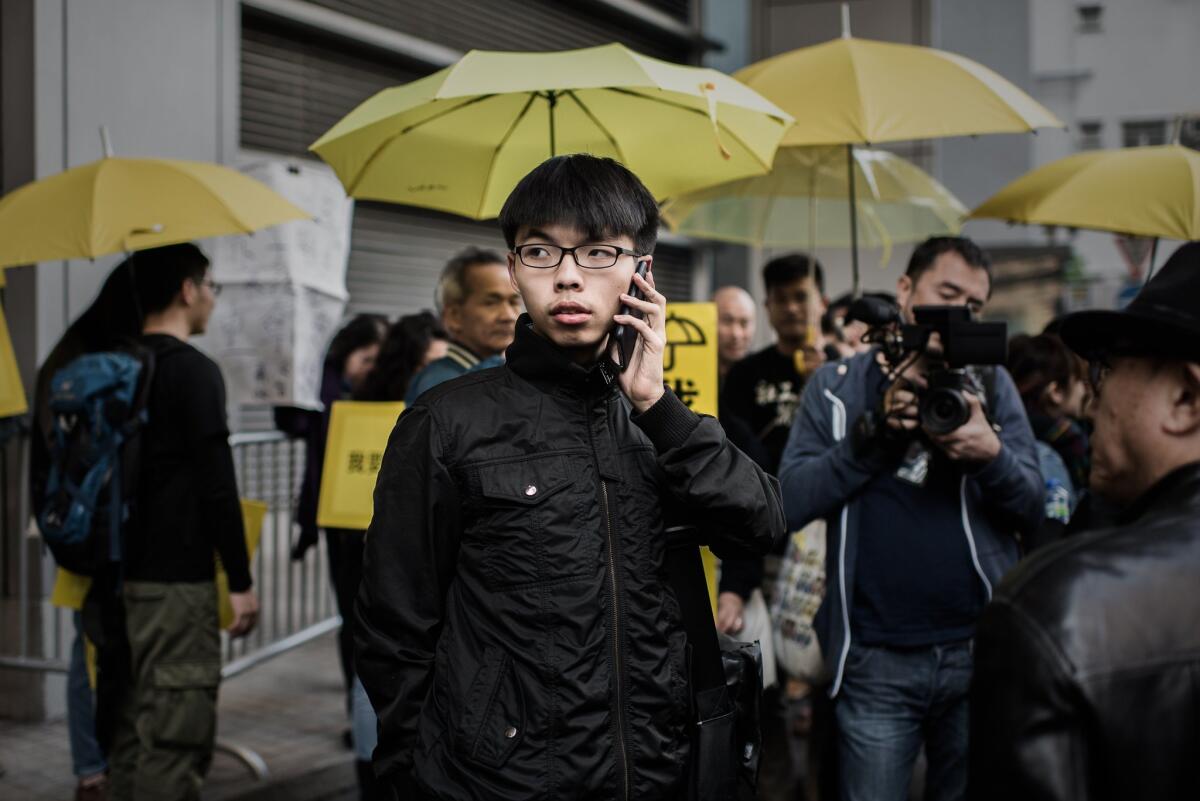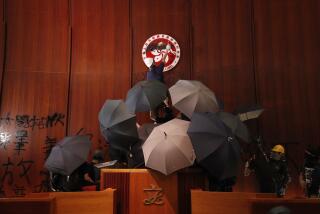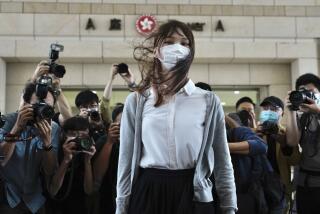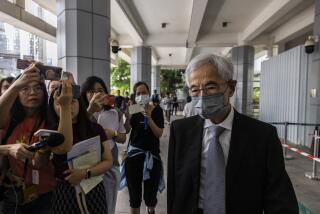Hong Kong police haul in protesters for ‘arrests by appointment’

Police on Friday arrested some of the student leaders of the territory’s pro-democracy movement, only to set them free within hours without requiring bail in an exercise some critics said smacked of harassment.
The “arrests by appointment” began earlier in the week, with the Hong Kong police’s organized crime and triad bureau summoning student leaders and certain city legislators in the so-called pan-democratic camp. All of them helped lead the Occupy Central movement last fall, a civil disobedience movement calling for free and fair elections for the highest office in the semi-autonomous Chinese territory.
About 20 people have surrendered to police this week so far -- all at scheduled times. After being told they were being arrested on suspicion of crimes such as inciting, convening and participating in unauthorized assemblies, all have been released unconditionally.
Hong Kong, a former British colony, reverted to Chinese rule 17 years ago under a framework known as “one country, two systems.” In August, the standing committee of China’s National People’s Congress laid down a restrictive framework for future elections of the territory’s chief executive, in effect limiting the choice of candidates to only two or three approved by a pro-Beijing nominating committee.
Beijing’s diktat touched off a wave of street protests lasting 10 weeks, with thousands of demonstrators clogging major thoroughfares and surrounding government headquarters. The sit-ins ended in mid-December after police acting on a court order cleared the streets.
Among those arrested Friday was Joshua Wong, head of the high-school student group Scholarism and one of the most high-profile leaders of in the street protests.
As he arrived for his noontime arrest appointment, Wong was cheered by 100 supporters, some holding yellow umbrellas, the symbol of the movement.
“Fear not political persecution!” chanted Wong, 18, sporting stubbles of an emerging mustache. He flashed a victory sign as he rode an escalator with his attorney into the bowels of the police headquarters, where he was to surrender.
Three hours later, Wong was released with a signed acknowledgement form with a case number. He said police had warned him that he may face a variety of possible charges, including instigating, organizing and participating in an unlawful assembly. He was then shown news footage culled from local TV broadcasts and YouTube as “evidence.”
“This shows the police aren’t ready to [formally] press charges yet,” said Eric Cheung, principal lecturer of the University of Hong Kong’s School of Law and former member of the government-appointed police watchdog panel. By making the arrests, “the police [force] violates its internal guidelines and undermines its authority.”
City legislator Leung Kwok-hung, who himself was arrested by appointment Thursday, said, “This is a political gesture and an abuse of due process.” The police, he said, were “trying to issue a psychological threat.”
Hong Kong police spokeswoman Odelia Pam refused to answer questions about why people were being arrested but not formally charged. She released a statement, which read in part: “Police conduct investigation and collect evidence of every case impartially with a view to taking further actions, including arrest or prosecution.”
Police Commissioner Andy Tsang said in December he expected to complete the investigation into the Occupy movement in three months and bring swift justice to all involved. All told, 955 protesters were arrested when police cleared out the encampments.
About 50 tents remain on the sidewalk outside the government compound, housing scores of holdouts. In a designated protest area in front of government headquarters, new fences and barricades have been installed and new “no graffiti” and “no posting” signs are up on walls previously festooned with protest flyers. But pro-democracy slogans have been freshly chalked on the ground in hopscotch-like squares
Student leaders of the pro-democracy movement have vowed to galvanize the public for another wave of civil disobedience actions next month.
Three co-founders of the Occupy Central protest movement, Benny Tai Yiu-ting, Chan Kin-man and the Rev. Chu Yiu-ming, as well as pro-democracy media mogul Jimmy Lai, have been told to report to police Jan. 22 and 24. Hong Kong Federation of Students leader Alex Chow, 24, said he was due to report for arrest Sunday.
“When fighting for democracy in an authoritarian government, you must be willing to pay a price,” Chow said. “But the reprisal will not end the fight for democracy.”
Chow, a comparative literature and sociology student aiming to finish his bachelor’s degree this year, said he hopes to pursue a doctorate in political science. But leading the occupation movement left Chow little time for studies, and he has deferred two courses -- one on police power, which held particular interest for him -- until next semester.
The protests, though, have changed his life for good, he said, and he feels the weight of expectation on his shoulders. At the same time, he’s still not sure what, if anything, the demonstrations accomplished.
“Many people tell me I should carry on my rule as a protest leader, but in what way?” asked Chow. “I am not sure if we did change anything at all. Is the situation getting better or worse after the protests? Even if we did achieve something, we will make the same mistakes if we do not learn from this experiences.”
Chow said the protests have affected not only him but his family. His parents, mainland China natives who migrated to Hong Kong before his birth, now run a garment factory on the mainland. Security authorities have issued them some warnings, Chow said.
Chow described his parents as “pro-establishment moderates,” and said they bombarded him with phone messages and articles calling for a halt to the protests. But they also were constantly messaging him, expressing concern about his health.
“Our parents immigrated from the mainland China to Hong Kong. They came here because they think here is better, and so they have no complaints,” said Chow. “But my generation is different -- Hong Kong-born and Hong Kong-raised. This generation has totally different views on how a place they call home should be ruled.”
“That’s why we are not satisfied with the situation in Hong Kong, and we want Hong Kong’s problems to be solved by Hong Kong people.”
Law and Hui are special correspondents. Times staff writer Julie Makinen in Beijing contributed to this report.
More to Read
Start your day right
Sign up for Essential California for news, features and recommendations from the L.A. Times and beyond in your inbox six days a week.
You may occasionally receive promotional content from the Los Angeles Times.






